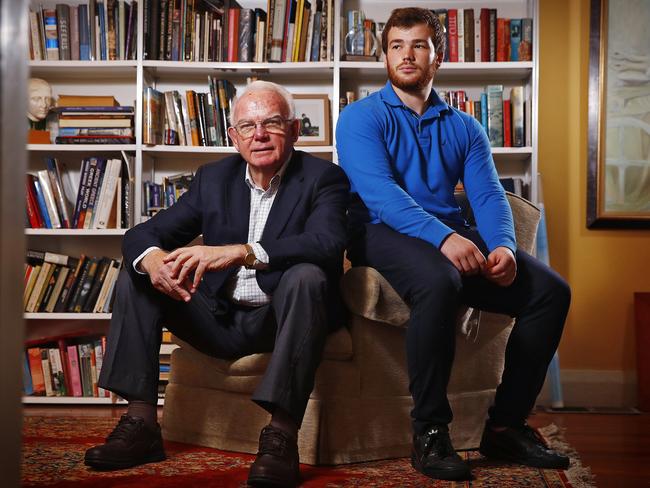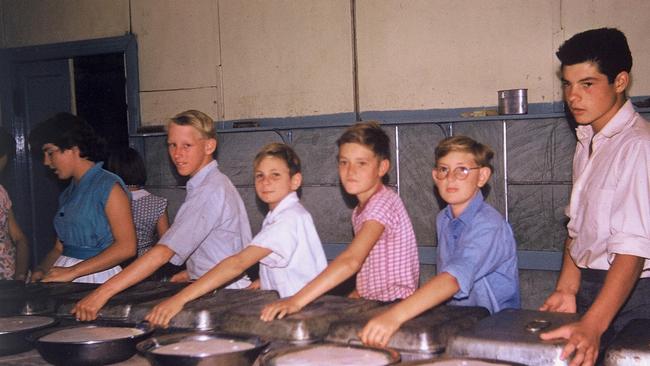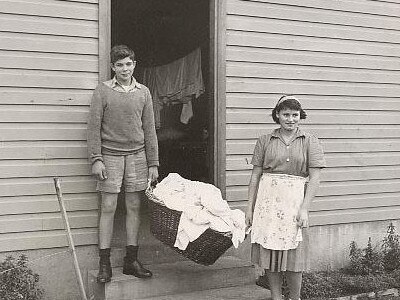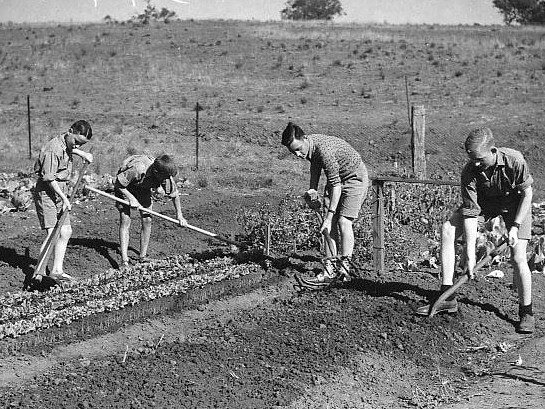Forgotten Children of Fairbridge Farm denied justice, author David Hill says
The “forgotten children” of Fairbridge Farm may have won a civil victory, but author David Hill is angry perpetrators of the years of sexual and physical abuse will never face justice.
Sydney Weekend
Don't miss out on the headlines from Sydney Weekend. Followed categories will be added to My News.
It is a story that has been with him almost his entire life but it still has the power to break David Hill.
Talking about the horrific treatment little boys and girls endured at the Fairbridge Farm School in Molong, central west NSW, which he first exposed in his 2007 book, Forgotten Children, Hill has to take a few moments to compose himself.
“When I wrote Forgotten Children, (my son) Damian turned six and I used to walk him up to Randwick School in the mornings and pick him up in the afternoons and during the day I’d be writing the book,” Hill says.
“And I’d look at him and think of a little kid in our cottage called Kerry, and Kerry was five and I remember looking at (Kerry) under the shower one day and he had all these bruises.”

Hill pauses to compose himself.
“And walking Damian home from school after writing about that …”
The sentiment is well understood, even if the sentence remains unfinished.
Forgotten Children
Hill is speaking ahead of the release of his new book, Reckoning. In it he recaps the events he covered in the first book, of the thousand-odd children aged four to 15 who were sent from England to the Fairbridge Farm School between 1938 and 1974, unaccompanied by their parents, in the hope of a better life.
In The Forgotten Children, Hill revealed how far from that promise the reality of life at Fairbridge was.
And in Reckoning, he finishes the story, with the events that snowballed after he penned his first book, ending with all five “guilty institutions” admitting fault and paying compensation.

They include the British government, the Australian government, the NSW government, the UK Fairbridge Society, and the NSW Fairbridge Foundation.
He explains no justice can ever repair the damage that years of sexual and physical abuse has on a child, but it’s still a victory of sorts – one which resulted in a record compensation payout.
Hill, who became chairman of the ABC and head of NSW’s State Rail Authority, was sent to Fairbridge Farm School in 1959 when he was 12, with his two brothers, Richard (his twin) and Dudley, spending almost three years there.
He considers himself one of the lucky few, if such a word can be used to describe his childhood. His abuse was not as severe as what some of the other kids copped, he says.


He had his brothers with him as a kind of collective security. And his mum Kathleen, who was a single mother of five in the UK struggling to put food on the table, followed her sons out to Australia three years later.
For these, and other reasons, Hill chose not to be included in the landmark civil action case that began in 2008.
“My experience was at such a low end of seriousness compared with what happened to the others,” he says.
“And I found from the start I could play a far more effective role as an advocate for the other kids in representing their interest if I wasn’t in the line with my hand out for compensation. Then nobody could say I had a financial or a vested interest in the outcome.”
Long legal battle
Despite the legal triumph, Hill remains angry, mostly at the fact the win came at the end of an eight-year battle that ended in a compensation payout in mid-2015 and was too late for the 50 former Fairbridgians who died in that time.
“I’m angry because they got away with it for so long, nobody was ever charged let alone convicted and most of them have gone to the grave now,” he says.

“In the seven or eight years of legal process, we never even heard any evidence at all, we were just bogged down responding to technical and legal queries from the other side.
“What really makes me angry is that not only was the NSW government in breach of its own model litigant guidelines, it was in breach of its own policy which says you shouldn’t drag these things out, you should try to expedite a result, you should go to mediation.
“And nobody was ever called to account for that. It’s bloody disgraceful that they can manipulate and abuse the legal system to deny people justice, particularly poor, disempowered, dispossessed, disenfranchised former institutionalised children.”
Shocking stories of abuse
Thanks to the protracted court case that excluded evidence, nobody got to hear the story of little Vivian who was five when she arrived at Fairbridge and was sexually abused, then had her head flushed down a toilet by her “cottage mother” in a perverse bid to correct her bed wetting.
We didn’t hear about little Paul, who was six when he arrived at Fairbridge from the other side of the world and was separated from his sister Wendy straight away. He committed suicide as a teenager.

Then there was “Tubby” Walker who was dragged out of bed in the middle of the night and whipped with an ironing cord by a sadistic cottage mother. And the 13-year-old boy who was beaten for reporting a kitchen supervisor who had raped him.
Hill estimates about 60 per cent of survivors claimed to have been sexually abused at Fairbridge. He interviewed dozens of former Fairbridgians for his two books and a documentary he made for the ABC in 2009 called A Long Journey Home.
While the children with disadvantaged backgrounds in the UK were promised a “better life” in Australia with fresh, country air, an education and good food and accommodation – “oranges and sunshine” as Hill recalls – the reality was a stark contrast.

At the age of 15, the children were forced to leave school and work the farm, rising before dawn to milk cows, muck out pens, collect eggs, bake bread, help prepare meals, clean laundry, slaughter and butcher livestock, and grow vegetables, often without shoes even in the middle of winter.
And corporal punishment was swift and regular, most often metered out by Fairbridge principal Frederick Woods who towered over most of the children at 6ft 3in wielding weapons such as a broken hockey stick.

Reckoning
A series of apologies came, perhaps as a result of Hill’s first book. In 2009, then-prime minister Kevin Rudd made an apology in parliament to institutionalised children, including child migrants, and in 2010, then-British PM Gordon Brown apologised to British child migrants in the House of Commons.
And three years after the Australian court case, the British government and the UK Fairbridge Society agreed to compensate all surviving British child migrants.
But is that justice?
It’s a question Hill asks in the final chapter of Reckoning.
“In some respects justice can never be done, great wrongs can never be righted, pains, shame, guilt, diminished self-esteem and trauma are long lasting,” he writes.
“The damage caused by crushing the spirit of a small child is impossible to repair … the wounds inflicted never completely heal.”





